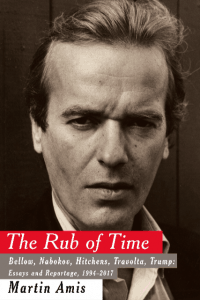Martin Amis
Why the South summons the British author
BY ALEC HARVEY

Though he’s lived in the United States for five years, Martin Amis is still distinctly British.
The accent is there, of course, and so is the unbridled wit – unencumbered by political correctness — that he often says Americans are lacking. Most of all, though, he’s considered a “British writer.”
But that could change. Amis, who has visited Mississippi twice before, is coming again to appear at the Oxford Conference for the Book March 21-23, and this time he might be doing a little research for an upcoming book based in the South.
“The South is strange and fascinating to me,” Amis says from his new home in Brooklyn that he shares with is wife, the author Isabel Fonseca (they recently moved after a fire at their previous home). “I’ve got to write about it – not at this moment, but sometime soon, maybe. I wouldn’t call it a scouting trip. You just go there and try to absorb something through osmosis rather than use a notebook. I’d do a lot of reading about the South, too. It would have to be about race, I guess. That would be the focus.”
 Right now, Amis, the son of author Kingsley Amis, is still promoting his book released late last year. “The Rub of Time: Bellow, Nabokov, Hitchens, Travolta, Trump: Essays and Reportage, 1994-2017” is a collection of essays, criticism and journalism that showcases Amis’ range, from polarizing opinions about Islam to pieces about his late friend Christopher Hitchens and, of all people, the actor John Travolta. It’s a mix of politics, celebrity and literature that has garnered some mixed reviews, too.
Right now, Amis, the son of author Kingsley Amis, is still promoting his book released late last year. “The Rub of Time: Bellow, Nabokov, Hitchens, Travolta, Trump: Essays and Reportage, 1994-2017” is a collection of essays, criticism and journalism that showcases Amis’ range, from polarizing opinions about Islam to pieces about his late friend Christopher Hitchens and, of all people, the actor John Travolta. It’s a mix of politics, celebrity and literature that has garnered some mixed reviews, too.
“Writers tend to pretend they don’t care about reviews or read them, but even if you make an effort not to read them, you still get a pretty good idea by the end of it,” Amis says. “The reaction has been, as far as I can tell, pretty good.
“The trouble with reading reviews, and any writer who’s honest will say it, is that ecstatic praise has not much effect on you, and any dispraise or criticism you think is outrageous,” he adds.
“Even a good review might have some inaccuracy that will stay with you a couple of hours and sometimes longer, and it’s a distraction. As you get older, you tend to keep the reviews at arm’s length.”
Putting the volume together meant combing through his extensive work that had not yet been collected, Amis says.
“I had a look at what there was that had been uncollected, and there was certainly enough,” he says. “In the end, I was paring it down rather than bulking it up. I had done four collections and now five. I seem to have enough. I’m always amazed.”
Amis says pieces like the Travolta profile are a piece of cake compared to some of his essays.
“Writing a literary critical essay is very hard going, I find, unlike reportage where the material is all given to you,” he says. “I don’t like doing essays at the time, but I’m pleased that I’ve done it when I’m finished. There’s sort of a grim satisfaction that I finished it.”
Amis, whose works include the novels “Money” and “London Fields,” the award-winning memoir “Experience” and two books (“Time’s Arrow” and “Yellow Dog”) nominated for the prestigious Booker Prize, is, as evidenced by “The Rub of Time,” also a prolific essayist and magazine writer.
The essays are “a way of staying in touch and engaged and using a set of muscles that you know you have, but they need exercise,” he says.
“There’s very little calculation when it comes to novels,” Amis continues. “You don’t even know what you’re doing until you’ve been doing it at least a year, and then it takes shape in your mind. With essays and journalistic commissions, you are very aware of what you’re doing at all times. You have a deadline, you have a length, and not much freedom.”
Amis writes for a few hours every morning.
“That when I really take on what lies ahead of me that day,” he says. “If it’s a novel, then I feel very buoyant when I get up. If I’m struggling through an essay, I get up with a heavy tread. There’s no variation in that routine. Anthony Trollope, who wrote 40 novels, mostly very long, only wrote for three hours a day, and that’s about right. The thing is that you’re not exhausted, but you’re sort of not really good anymore. You’ve skimmed away at the new energy that you somehow acquired overnight, and you’re sort of done.”
“Controversial” is often attached to Amis’ views, whether on Islam, on euthanasia or any number of subjects.
“There’s no intentional stirring of the pot, but it just often turns out that way,” Amis says. “There are no subjects that are automatically off the table for me. It does appeal to me when I have a difficult, touchy, dangerous subject. That doesn’t put me off.”
Sometimes, though, he does have enough. Such was the case in 2004 when, after some harsh reviews for “Yellow Dog,” he relocated to Uruguay go write his next novel. In 2012, after having returned to London for a few years, he and his family moved to Brooklyn.
“I’m here to stay indefinitely,” Amis, 68, says of the U.S. “I can imagine wanting to go back at the end. British people are at least as friendly and tolerant as Americans – maybe not as hospitable, but they are tolerant.
“What they do have that Americans have historically not had a chance to develop is wit,” Amis adds. “The British are a very witty people. Americans can be witty, but the diverse culture seems to stifle humor.”
Amis goes on to cite Alexis de Tocqueville, who, in the 19th century, said that eventually the melting pot of America would result in no one saying anything for fear of offending someone else.
“That does tend to make humor a bit blander,” Amis says. “There’s nothing innate in Americans that make them less witty. It’s just more like an eggshell cover. They tread lightly.”
Next up for Amis is a novel about three friends and mentors of his – Hitchens, novelist Saul Bellow and poet Philip Larkin.
“I’ve been trying to write it for 15 years, and I think I’m eventually going to finish it this year,” he says. “Once I get that done, I’ll feel wonderfully unburdened.”
The Oxford Conference for the Book takes place March 21-23 at the University of Mississippi and other locations. Most events are free. For more information, go to oxfordconferenceforthebook.com.







